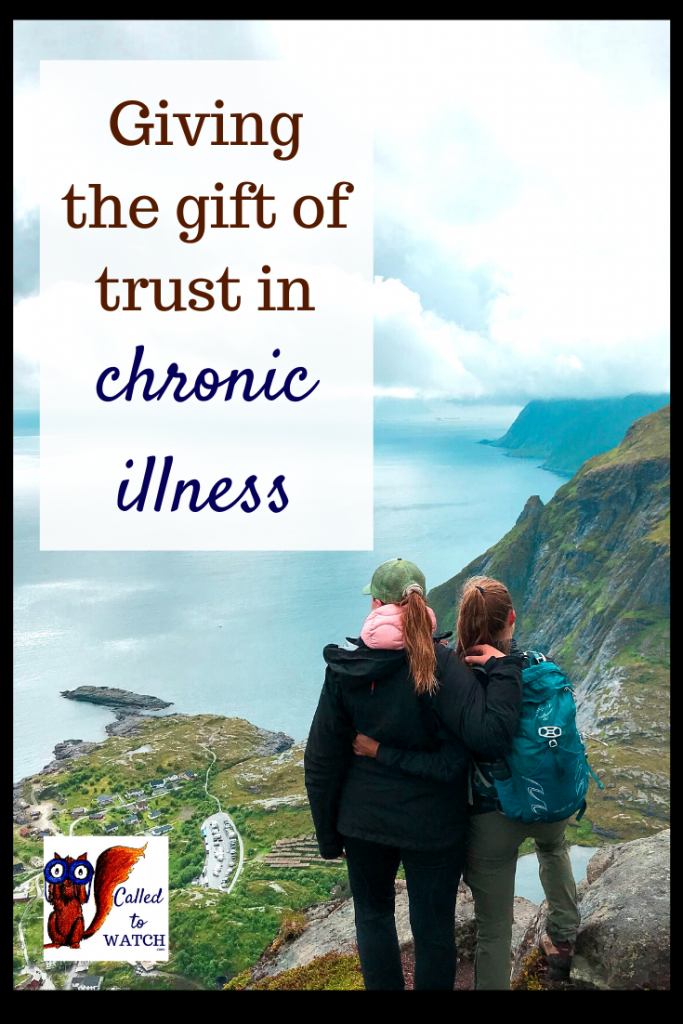‘Relationships are built on trust’ – that’s a phrase you hear often. But have you ever considered that trust might be more than a necessity? That it might actually be one of the greatest gifts you can give someone, particularly someone who is living with a chronic illness?
The Oxford dictionary defines trust as the ‘firm belief in the reliability, truth, or ability of someone or something.’
Think about that for a moment. With this definition in mind, how would you feel if someone said, ‘I trust you’? I’d feel pretty good. I’d feel recognized, validated and affirmed. I’d feel more confident in myself. I’d feel challenged to ‘keep up the good work’. All that from three words.
Giving the gift of trust in chronic illness
Imagine the impact of this on someone who is feeling invisible, because they can’t leave the house much; or someone who feels like a failure because they cannot participate in life as they would like to; or someone who feels helpless in the face of their illness. What a gift the gift of trust could be!
But wait.
For the gift to ‘work’, we have to believe what we say. A lie is not a gift, it’s an insult. Read the definition of trust again. Who do you feel you trust according to this definition? Who don’t you trust?
A firm belief in someone’s reliability, truth or ability... That doesn’t sound like it fits with our experience of chronic illness. Someone struggling with their health might not be able to be ‘reliable’, they may not always be ‘able,’ and sometimes those who have dementia or other cognitive impairments may not always speak what we recognise to be true.
How then, do we trust in the context of chronic illness (and life!)?
ONE
Firstly, we remember that trust isn’t about finding the Perfect Human™. Sorry to disappoint you, but they don’t exist. No one, chronic illness or not, is reliable, able or truthful 100% of the time.
TWO
Secondly, we realise that trust isn’t something that happens once. Rather we choose to trust someone again and again in the small details and events of life. Every time we get in the car with someone (without asking to drive) or eat a meal they’ve prepared (without asking if they washed their hands or cooked the meat at an appropriate temperature or added some tasty arsenic) we’re sending a message: I trust you.
THREE
Thirdly, we remember that trust looks different at different times and for different people. For instance, I might not trust my thirteen year old friend to drive me to the shops, but I will trust them when they tell me they are having trouble at school. Five years later, however, I may choose to trust them to drive me to the shops!

One thing we should always trust
Trust is a beautiful gift to someone, and it’s important to remember it’s a gift you can give everyone. That’s because we can always trust someone in at least one area – we can always choose to trust that someone is telling the truth about their emotions.
‘I feel… upset, scared, angry, hurt, disappointed.’ We may doubt many things, but I think we need to be very careful before we tell someone we don’t believe their feelings. After all, we can’t prove someone doesn’t feel sad or scared, content or hopeful – we can’t get inside their heads – and so there’s no irrefutable reason not to believe them. ‘I believe you’ can be the most affirming, comforting response in an emotional situation, and it’s a gift we have no reason not to give.
Practical examples of giving the gift of trust in chronic illness
The Oxford Dictionary’s definition is helpful, but it’s quite abstract. Here’s what trust thought-patterns might look like in the reality of chronic illness:
Reliability
‘You said I could drop by every Wednesday afternoon, so I’m going to (even if I suspect that every other week I’m just going to have to go home because you are too unwell).’
‘I’m going to assume you’ll keep our phone meeting until it’s proven otherwise (even if I wonder how many times you’re actually going to be well enough to keep it).’
Ability
‘You know your illness better than me, so I’m going to ask what you need help with (even if I think I already know).’
‘I’m going to assume you are proactive and ask what you have already tried (rather than assuming I am your first port of call).’
Truthfulness
‘You told me you don’t need help in this area, so I’m going to trust you’re telling the truth (even if I think you do).’
‘You have just told me you are feeling well enough to go out today, so I am going to believe you (even if I think you look terrible).’
Of course, we’re not going to necessarily say these things. Often trust is displayed in what we do. It’s about honouring and respecting the other person, knowing that we might get hurt or waste time or energy. It’s about choosing to trust what people say until proven otherwise, even if we think from the outset that they could be wrong.
Trust is about foregoing a need to micromanage in areas we don’t really need to.
calledtowatch.com
Sometimes it’s more important to trust than for everything to go smoothly or perfectly or most efficiently.
I suspect this post has raised many questions – there’s so much more to discuss! I hope you will join me as I explore trust in more detail over the next few months.
In the meantime, let’s reflect again on Isaiah 50:10 –

//Trust is a beautiful gift – how can you give it more often?
Missed my Christmas Gift? To keep in the loop about my upcoming memoir, follow the link below!
PS: Enjoyed the post above? Get the next one delivered straight to you! Sign up for email notifications
I’m also on Facebook, Pinterest, Instagram & Twitter! Meet me there for more interesting reads, resources and community.

